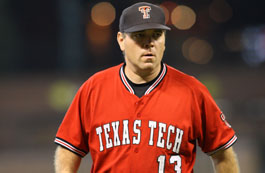Oct. 10,
2008
Nine
Innings with Dan Spencer
By Sean Ryan
CollegeBaseballInsider.com
Co-Founder
 For
the first time in more that two decades, there will be a new man
in charge at Texas Tech. Dan Spencer (pictured left) is the new
head coach of the Red Raiders. He replaces Larry Hays, who
guided Texas Tech for 22 seasons and compiled more than 1,500
victories. For
the first time in more that two decades, there will be a new man
in charge at Texas Tech. Dan Spencer (pictured left) is the new
head coach of the Red Raiders. He replaces Larry Hays, who
guided Texas Tech for 22 seasons and compiled more than 1,500
victories.
A former CBI journalist, Spencer was the 2007
National Pitching Coach of the Year at Oregon State. He spent 11
years with the Beavers and the final three as associate head
coach, concentrating on pitching and recruiting. Spencer helped
guide Oregon State to consecutive national titles in 2006 and
2007. He was an assistant coach with Texas Tech this past
season.
A native of Vancouver, Wash., Spencer was an
infielder with the Red Raiders and played one season under Hays.
He completed his degree in history at Portland in 1990.
First Inning – You came back to Lubbock last
year as an assistant coach after playing for Texas Tech from
1985-87. How did it feel to come back?
It felt great to come back. Obviously I enjoyed
my time in Corvallis, but I had been there a long time and the
opportunity to go back to where you played and get in the
sunshine in a new conference with different challenges was
intriguing.
Second Inning – You played for Larry Hays and coached with
him last year. How has he shaped your life or career?
Coach Hays is a great person first and secondly a
great coach. I think the balance that he has in his life is
worth trying to copy. Our personalities are different, but the
principles need to be the same.
Third Inning – In 11 seasons at Oregon State, you were part
of the transformation of a program. How did it happen?
I think getting into the Pac-10 in 1999 and
building Goss Stadium in the same year started it. Being in the
Pac-10 forces you to recruit better and the league and the
facilities allowed us to attract the players we needed to get it
going. The other obvious key is that the Oregon high school
class of pitching in 2003 and 2004 was very good and we kept
most of them. Buck, Gunderson, Nickerson, Turpen, Kunz, Paterson
and Stutes was a pretty good place to start on the mound. As you
know if you cannot pitch you will not win when it matters.
Fourth Inning – Three straight trips to Omaha, two national
titles. Do you still pinch yourself?
No doubt about it. To get to Omaha three times
and win it twice is an experience not shared by many. In
retrospect it is very humbling, knowing that a lot of great
coaches have not been to Omaha.
Fifth Inning – Looking back, what will you remember most from
your two national title teams?
That one is easy. I remember most the character
and competitiveness of our players. I do not think that in
either year we were the most talented team in the country, but I
believe we were the toughest.
Sixth Inning – Was it tough to leave Oregon State?
It was very hard to leave the players that you
coached and recruited. I am from the Northwest and my wife is
from Corvallis, so it was tough to leave the grandparents and it
is always tough to leave friends, but the hardest thing is to
leave the comfort zone that comes from being in one place for a
long time.
 Seventh
Inning – What's different so far between being an assistant
coach and a head coach? How can your years as an assistant help
you as a head coach? Seventh
Inning – What's different so far between being an assistant
coach and a head coach? How can your years as an assistant help
you as a head coach?
You have a lot more friends when you are the head
coach. I think the key is to not change who you are or how you
coach just because you have a different title. Obviously there
are a lot more meetings and things to do outside of baseball as
the head coach. The one thing I will remember is that a head
coach is only as good as the people you surround yourself with,
basically your coaches and your players.
Eighth Inning – What is the first step in turning things
around in one of the toughest conferences in the country?
Recruiting. It starts on the mound, so you have
to pitch. Also, my feeling is that you have to be fast. Speed
plays both ways: offensively and defensively. The other key that
may be the toughest sell is to convince your team that you can
win big before you do.
Ninth Inning – What goals have you set for your team for
2009?
To win as many games as we are supposed to win.
To play the same way if we are playing a Tuesday game, as we
would in a conference game on the road. Relentless consistency.
Tenth Inning – Describe yourself as a coach? Has that changed
at all now that you're a head coach?
I try to be consistent day to day and not ride
the roller coaster of five straight wins or five straight
losses. I try to remember that you are coaching somebody else's
kid and to separate the performance from the player. The
relationships with players after they leave school is very
important to me. I think the key is to not change my approach
just because my title is different. I do not think that I am
intelligent enough to try and change my approach.
(photos courtesy of Texas Tech Media Relations Office)
|